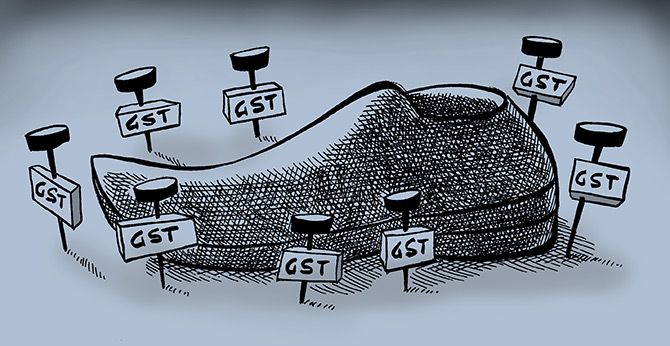 | « Back to article | Print this article |
'I don't know how long the small-scale handmade sector can survive,' a shoemaker from Hisar tells Geetanjali Krishna.
Illustration: Uttam Ghosh/Rediff.com

The government would have us believe that the goods and services tax regime is going to result in far-reaching tax reforms in the country. It couldn't be farther from the truth, I've found, during the course of an informal survey on the impact of GST on artists, weavers and artisans across the country.
Their experiences illustrate all that's wrong with a system that neither distinguishes between handmade and machine-made products, nor between industrialists and rural craftspeople.
Also by implementing a system in which tax is deducted before a product is actually sold, craftsmen, both rural and urban, are facing all sorts of problems in doing business.
The case of the Gehlots from Hisar, Haryana, illustrates this.
Manufacturers of traditional leather footwear (,em>juttis), the family has been in this trade for generations.
Most of their sales are direct, through fairs and exhibitions across the country.
"We had assumed that since our turnover was under Rs 10 lakh (Rs 1 million), we would not be affected by the implementation of GST," said Rajesh Gehlot. "But I was wrong."
Gehlot found that soon after GST was implemented, several aspects of his business were in disarray.
"The biggest problem we've faced is in the transportation of our goods," he said.
Since the market for traditional shoes in Hisar is limited, the family relies on out-of-state sales.
"All these years, we've sent our goods to Bengaluru, Mumbai and Delhi without any problems," he said. However, now, the same courier companies that they have dealt with for years, are refusing to carry their goods without an e-way bill.
To bring their goods to the Dastkar Mela where I met them, the family had to ferry them personally.
The tax on raw leather has gone up from a pre-GST rate of 5 per cent to 12 per cent, but there are other escalating costs the Gehlot family is more concerned about.
"Many of our shoes are fabric-covered, or embellished with embroidery," he said. Now there is additional tax on these as well.
"Moreover, GST has caused our overall travel costs to go up substantially," he said. Boarding, lodging and transport costs have risen.
"Everything, from the room we've rented, to travel and food, seems much more expensive this time," he said. "In fact, many vendors have simply raised their prices and wrongly attributed it to GST."
The confusion over GST is making it hard for people like the Gehlots to verify these claims, and this is further pinching the bottom line of the family business that participates in several exhibitions through the year.
Moreover, to stay competitive in an increasingly price-sensitive market, the Gehlots have not been able to build these costs into their MRP.
"Our juttis used to sell for Rs 700, Rs 800 before GST was implemented," Gehlot said. "Now, when we tried to increase our prices, we found that our sales dropped."
Consequently, the family business, with its small turnover and minimal profits, is continuing to sell mostly at pre-GST rates.
The buyers of wholesale retail that once roamed these exhibitions were also hard to find today, Gehlot said.
"Earlier, they would order goods and pay in 60 to 90 days, an arrangement that suited everyone. Now that they have to pay for the goods as well as get taxed on them on the spot, they are in no hurry to place orders."
On the bright side, retail business has been good for the Gehlots at Dastkar, even though GST has eaten into their profit margins.
"At this rate, I wonder what sort of business I'm building for my next generation," he said.
"I don't know how long the small-scale handmade sector can survive this all." Neither do I.